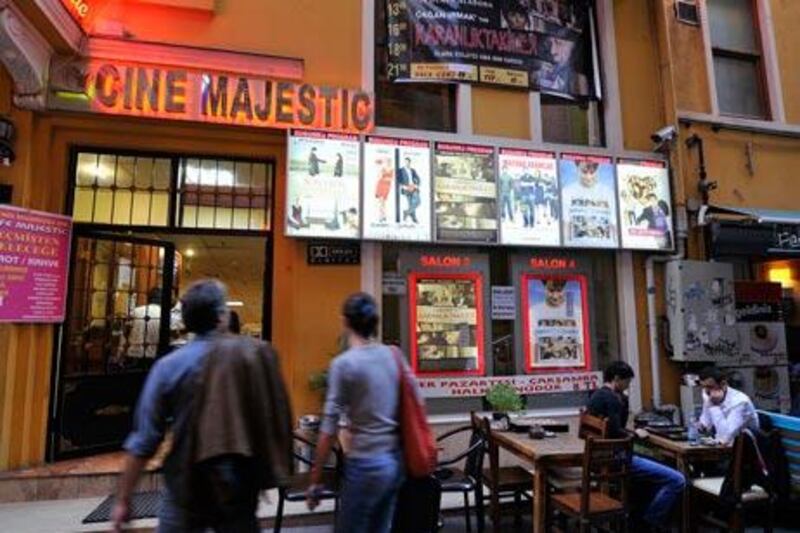In Beyoglu, Istanbul's cultural centre, it is almost impossible to walk down the street without passing a film crew. Aspiring directors seem to outnumber cab drivers. But don't look for ripped abs and silicon starlets: these Turkish filmmakers are wan and drawn, desperately earnest and deeply preoccupied with Turkey's rapid social transformation.
The one thing they have in common with their Hollywood confreres is a sense that the film industry is flush with money. About that, they are right. Thanks to economic and political liberalisation, the growth of private education in Turkey and government funding, the Turkish film industry is thriving. Last year, 75 feature-length films were made there. This week, five Turkish films are playing in local cinemas, and cinema luminaries are flocking to the Golden Orange Film Festival in Antalya.
When it was introduced in 2005, The International Eurasia Film Festival achieved international acclaim. Turkish movies regularly beat Hollywood movies at the local box office, and they have gained an art-house fan base abroad. At the Middle East International Film Festival, eight Turkish films are showing as part of the New Cinema From Turkey programme. Big budget films, too, have flourished, although few have received critical acclaim and one in particular, Kurtlar Vadisi Irak (Valley of the Wolves), was an international embarrassment because of its anti-Semitism (it was a major box office hit in Turkey, however). Despite the global economy, Turkish audiences have returned en masse to the theatres; the country's film sector expanded by 10 per cent last year.
Ali Pinar, a director with Corpora Productions who recently produced the zombie film Ada (Island), says: "Turkish filmmakers, whether mainstream or independent, are experimenting with different styles, shapes and contents." This drive, he says, has infused the industry and audiences with new energy. In the 1980s and 1990s, the Turkish film industry appeared to be dead, or at least profoundly moribund. There is no way to describe its recent change in fortune other than as a renaissance, for prior to this fallow period, Turkey's film industry was the world's third-largest. From the 1950s to the 1970s, Yesilçam, Turkey's Hollywood (the word refers both to a street in Beyoglu filled with production houses and to the industry itself), churned out some 300 movies a year. They were, in general, awful: those that were original were not good; those that were good were not original. Many were plagiarised from American movies. Still, the industry made money.
Then television killed the film star. Its belated arrival in the late 1960s nearly put Yesilçam out of business. Popular film production dropped dramatically. Art films were so closely modelled on European ones that Turkish audiences found them incomprehensible. The Yesilçam district fell fallow. By the mid-1980s, fewer than 10 Turkish films were produced annually. When the prime minister Turgut Ozal took power in 1983, he presided over an economic liberalisation over that, at first, further crippled the industry. The 1988 Law on Foreign Capital allowed the Hollywood majors to quickly displace local production and distribution companies.
But today's renaissance has origins in the rise of television and Ozal's reforms. Under Ozal, the television sector was denationalised and deregulated. In the mid-1990s, private stations flourished. Directors became popular talk-show stars, then used the proceeds from television advertising to finance their films. Investment in the television advertising industry created the advanced infrastructure and technical expertise to support the cinema revival.
The rise of private education during the Ozal years also promoted the industry's development. Film schools opened throughout the country. According to Sezin Kipsak, a research assistant at the Plato Film School and a cinema doctoral student at Marmara University: "The private universities are leading the way, and Bilgi University is the most important. All of the major directors are from these cinema schools."
Above all, the rebirth is owed to financial support from Europe and the Turkish government. In 1997, Eurimages, a powerful European film fund, initiated a scheme to support Turkish filmmakers. Movies produced under its aegis have been shown at international festivals, applauded by critics and awarded major prizes. "The influence of globalisation, modernism, postmodernism - all have contributed to the renaissance," says Kipsak. But the most important factor, she adds, is state support. "In the past five or six years, the government has been giving money, a lot of money, to directors. All of the big directors are making films with this money."
The pace of the revival quickened when the director Nuri Bilge Ceylan took the Best Film prize at Cannes in 2003 for Üç Maymun (Three Monkeys). "The government realised that everyone in the world saw this and understood Turkey better," says Kipsak. "It put the image of Turkey out there, it introduced Turkey to the world. The government thought: 'If the filmmakers had more money, they could do even better.'"
In 2005, Turkey's ministry of culture and tourism began providing substantial funding to the movie business. Since then, it has invested about 17 million lira (Dh42.6m) annually. This suggests an obvious question: Does this money come with conditions? "Directors seem to be quite free," says Kipsak, "but, yes, there seem to be conditions. I have many friends who have gone to the government but they can't get money. But this doesn't mean that difficult subjects, or projects that show social problems in Turkey, aren't being made. Quite the contrary. The support the government has given to Kurdish directors has really opened this subject up."
Filmmaking, certainly, has benefited from the loosening of the military's control over the state, the growing acknowledgement that there are, at least, Kurdish-speaking citizens in Turkey and the relaxation of political censorship. "There's no censorship compared to the past," Pinar says. "In the beginning of the 1980s, after the military coup, it was very hard to do movies about social realism, ethnic problems. Now you can do films about Kurds."
A large number of films are made by Kurdish directors and treat Kurdish themes. In 2004, Ugur Yücel's Yazi Tura (Toss Up), won Best Turkish Film at Antalya. It depicted the literal and psychological wounds suffered by Turks conscripted into the military in the south-east. Recently, a major Kurdish documentary was released with a full promotional budget. Iki Dil Bir Bavul (On the Way to School) chronicles the life of a schoolteacher assigned to a south-eastern village who discovers that no one there speaks a word of Turkish. "This was supported by the government," Kipsak says. "The amount of promotion it's been given is unprecedented, so this is very important."
The more open treatment of the Kurdish issue stands to reason, however. The governing AK Party is keen to demonstrate, particularly to the European Union, its commitment to solving the problem. But would it be as easy for filmmakers to find funding for movies that depict, say, governmental corruption or women who feel that their rights have diminished under AKP rule? "Maybe not," says Pinar, although he adds that only a few government representatives sit on the jury that awards funding. Most of the jurists are filmmakers. It is, he says, a vast improvement over the military censorship of the 1980s.
The deep seriousness of the country's aspiring filmmakers is perhaps due to the influence of private film schools coupled with Europe's and the Turkish government's implicit message that money is available to filmmakers who explain Turkey. Esen Kunt, a research assistant at the Plato Film School, is a graduate student in political science at Marmara University. She wants to make documentaries "about Islam, religion, gender and the transformation of intimacy in Turkey ... I believe intellectuals have a responsibility to criticise Turkey from the inside."
She puts her well-thumbed copy of the Turkish sociologist Nilüfer Göle's The Forbidden Modern: Civilization and Veiling, on the cafe table. "Cinema," she says, "is the camera obscura of Turkish political and cultural transformation. Especially in the last decade, Turkish directors have tried to criticise the struggle between modernisation and convention, customs, gender identity, the hegemonic masculinity of the ideology. Art, especially cinema, gives you a huge opportunity to understand the dichotomies and hybrid narratives of Turkish cultural history."
Her remarks go some way towards explaining why Turkish films have yet to become box-office successes overseas. And not every theatregoer in Turkey is persuaded that these new movies are an improvement over the Yesilçam classics. Serkin Yakn and Gülsah Yenidünya, both doctors, are waiting to see a Japanese movie in the lobby of the Cine Majestic on Yesilçam street. "Some of them are good," says Yenidünya, "but some not so good. The old movies were closer to us. They had more profound feeling. Now it doesn't have the same effect."
"The movies seem more like American ones now," Yakin says.





